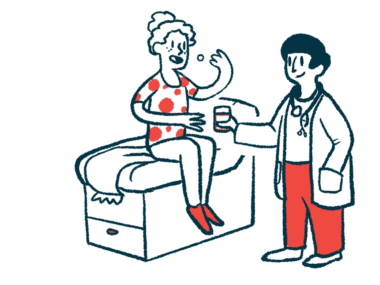Kyverna to conduct Phase 2 trial of cell therapy KYV-101 in MG
The FDA clears the company's latest investigational new drug application
Written by |

The U.S. Food and Drug Administration (FDA) has cleared an investigational new drug (IND) application from Kyverna Therapeutics, giving the company the go-ahead to launch a Phase 2 clinical trial that will test its cell therapy, KYV-101, in people with myasthenia gravis (MG).
This is the fifth IND application for KYV-101 to be cleared by the FDA. According to Kyverna, the upcoming Phase 2 trial will be an open-label, multicenter study called KYSA-6. The company did not provide additional details on the design or timeline of the trial.
“We are grateful that the FDA’s decision to clear the IND for our Phase 2 KYSA-6 trial will allow Kyverna to offer this potentially paradigm-shifting investigational treatment to patients,” Peter Maag, PhD, Kyverna’s CEO, said in a press release.
“We have seen firsthand the transformative effects of KYV-101 in MG patients treated with the investigational therapy in our clinic,” said Aiden Haghikia, MD, director of the department of neurology at the Medical Faculty of Otto-von-Guericke University in Germany. “I welcome the FDA’s decision and look forward to more clinical data to further our knowledge about CAR T-cell therapy in patients with severe neurological autoimmune diseases.”
MG is caused by self-reactive antibodies that interfere with the communication between nerve and muscle cells, ultimately resulting in muscle weakness and other disease symptoms.
Antibodies are immune proteins made by B-cells, a specialized type of immune cell. B-cells and the antibodies they produce are normally a key part of the body’s immune defense against infectious invaders. But in autoimmune disorders like MG, they target the body’s healthy tissues to drive disease.
KYV-101 is designed to destroy B-cells. According to Maag, the therapy is expected to provide MG patients with “a deep B cell depletion and possibly durable reset of their immune system,” which is expected to reduce MG-driving autoimmune activity.
KYV-101 is a CAR T-cell therapy. With this type of treatment, clinicians first collect a patient’s T-cells, which are a type of immune cell that’s able to kill other cells. T-cells then are engineered in a laboratory to be equipped with a chimeric antigen receptor or CAR, which is a man-made protein that directs them to attack a specific molecular target.
Targeting the CD19 protein in B-cells
With KYV-101, T-cells are equipped with a CAR that targets CD19, a protein that’s found on the surface of B-cells. The engineered T-cells are then infused back into the patient where they are expected to attack and destroy B-cells containing CD19.
Kyverna is developing KYV-101 as a potential treatment for multiple B-cell driven autoimmune disorders. The company is conducting two clinical trials — a Phase 1/2 trial in Germany called KYSA-3 and a Phase 1 trial called KYSA-1 (NCT05938725) in the U.S. — testing the therapy in people with lupus nephritis, a serious complication of lupus characterized by kidney damage and inflammation.
Last month, the company was given the go-ahead to launch another Phase 1/2 trial called KYSA-5 in the U.S. to test KYV-101 in people with certain forms of scleroderma.




Leave a comment
Fill in the required fields to post. Your email address will not be published.